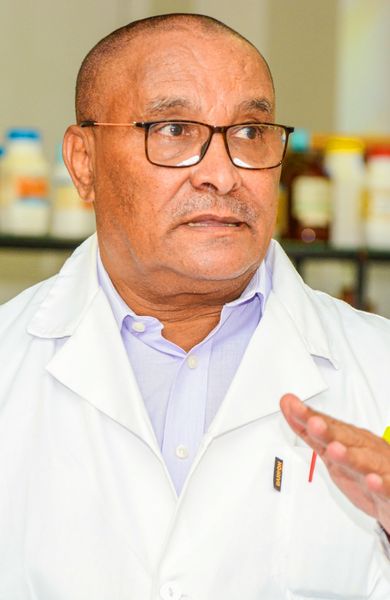Phuthalichaba, a rapidly growing Financial Cooperative incubated under the National University of Lesotho (NUL) Innovation Hub is an economic game-changer for Lesotho! That is according to Mr Tebello Tjapela, the NUL Masters of Economics student and the Chief Executive Officer (CEO) of the esteemed cooperative which seeks to become “The Bank of the People,” in future.
(Join PhuthaLichaba here: www.phuthalichaba.com)
“Phuthalichaba, with an army of 300 members already on its warchest, is a game-changer because it is meant to go where no other financial institution in Lesotho has gone before,” Mr Tjapela said. “Our target to invest in start-up businesses shall make us unique in Lesotho’s financial landscape.”
As an Economist, Tjapela is too eager to demonstrate the role of Phuthalichaba within the mysteries of Economics. “Phuthalichaba will start by introducing perhaps one of the most widely used paths to achieve economic growth, in any country,” he said.
Don’t go away. We are going to introduce an Economics equation which you will be very happy to understand once we explain its components, one by one:
Y = C + G + I + NX
Well, this equation is not too intimidating—so wait as we explain Phuthalichaba’s role in it.
(Y ) is the level of a country’s economy known as Gross Domestic Product or GDP. (C) is Consumption—that is, how much money do people spend? (G) is Government Spending—government uses tax-payers’ monies building things such as roads and schools. (I) is Investment—that is, putting money into savings, innovation, techonolgy and businesses. (NX) is the Net Exports. It refers to how much our exports are compared to our imports as a country. The more exports compared to imports, the better.
“This is what we learn from the equation. If you increase any of the components on the right side of the equation: (C), (G), (I), (NX), you increase the level of a country’s economy (Y ) at the right side of the equation.”
Sounds good? Ya.
But as your know from experience, trying to improve an economy of a country is one of the hardest things to do. In fact, even as many governments talk economic growth daily, their actions show that they have long given up, choosing, instead, to just move along with the world’s economic waves.
Phuthalichaba’s aim is to influence the Investment part of the equation. “That is because if you increase Investment, you do not only increase the level of the country’s economy, you also increase Consumption, Government Spending and Net Exports,” he said.
For instance, if you invest in the NUL Innovation Hub’s Mohalalitoe Soap, such that it can be mass-produced, you create jobs. Employed people can spend or consume (C). They and the company which hires them pay taxes so that the Government itself can also spend (G) and Mohalalitoe can now be exported (NX).
No doubt by now we all agree that (I) is the most important component of the equation.
Yet Investment is what is lacking in Lesotho! Yep! We avoid investment like we avoid fire, preferring to call upon foreign investors (boramatsete) to do the work of investing for us.
That was, until Phuthalichaba stepped in.
“Our primary goal is to invest in Lesotho’s start-up businesses such as the innovative start-ups of the NUL Innovation Hub,” Tjapela said.
Investment starts with saving. Phuthalichaba is already encouraging the culture of saving by mandating its members to save at least once a month into the coffers of the cooperative. Due to Phuthalichaba’s complete use of technology, any Mosotho anywhere in or outside Lesotho can join and save.
(Join PhuthaLichaba here: www.phuthalichaba.com)
One of the most quoted models of Economics, called Solo Growth Model, states that increase in savings increases a country’s economic growth but in the short term. However, according to that model, Tjapela said with emphasis, “it is the sustained increase in technology that improves a country’s economy in the long run.”
Now we are getting to the bottom of the argument. It is only by using the money we save, that is, by investing it in technology and innovation that we will start seeing serious economic growth.
Nobody is doing it—nobody has any concrete plans to do it anytime soon, at least in the format Phuthalichaba is proposing, as far as we know.
To drive the point home, Tjapela praised the local banks for one thing, “our banks are doing very well for what they were designed to do, that is, to work as commercial banks.” But it ends there, he said. Investing in start-up businesses in such a manner as to help those businesses to start practising mass production is not in the banks’ DNA.
Phuthalichaba is designed to invest in innovative start-ups by buying shares in those businesses. Start-ups need to sell shares to raise money, they don’t need loans—because, quite frankly, how do we expect them to start paying back at the end of the month when it may as well take 5-10 years for them to start making profits?
“I can foresee Phuthalichaba investing in, for instance, Molleloa yogurt, which will, in turn, create a huge market for milk farmers. In the end, jobs are created in Lesotho, using raw materials from Lesotho with taxes paid in Lesotho,” he said.
What is in it for Phuthalichaba members? “You don’t only get into the culture of saving your own money in your own entity. You also have a chance to borrow. More importantly, you become an indirect shareholder in any businesses into which Phuthalichaba will invest on top of being a shareholder in PhuthaLichaba itself.”
(Join PhuthaLichaba here: www.phuthalichaba.com)


